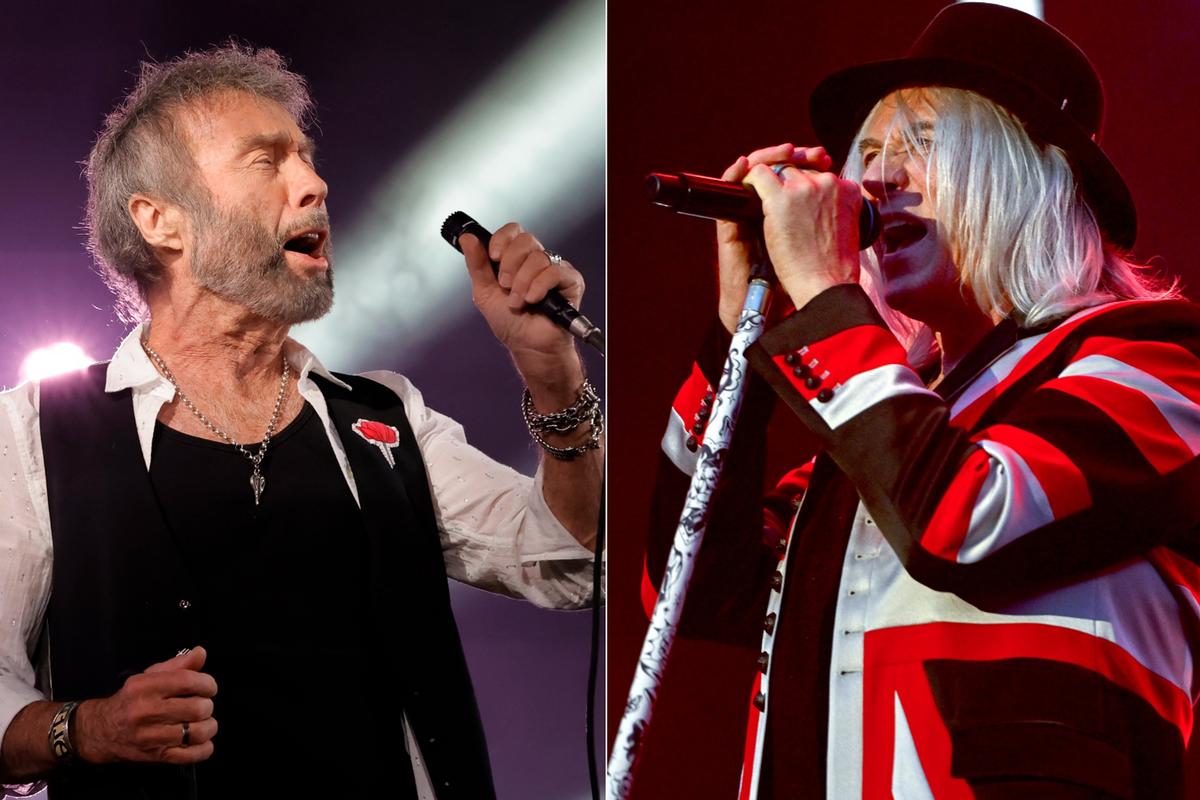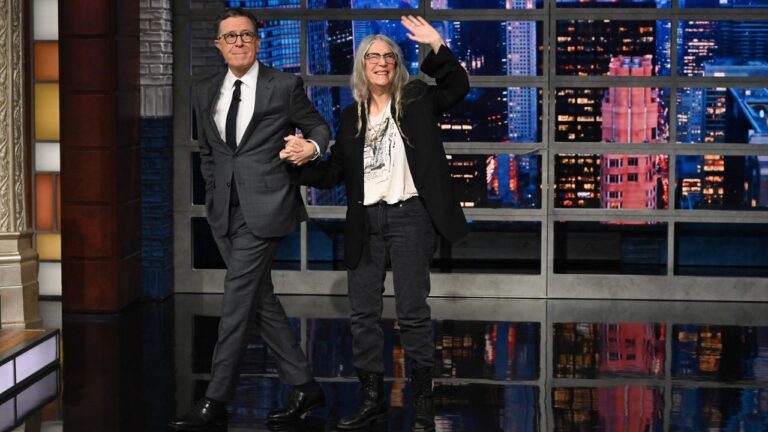If you spend any amount of time talking to Def Leppard’s Joe Elliott, one of the best things you’ll discover is that he’s a real music fan, rabidly passionate for the things, artists and bands that he loves, just like you.
With Bad Company’s pending induction this weekend into the Rock & Roll Hall of Fame, we got together with Joe for a lengthy conversation where he shared plenty of stories with us, tracing his love of Free, Mott the Hoople and eventually, Bad Company.
“No band deserves it more,” he told UCR via Zoom. “I’m happy that Mick Ralphs knew he was in before he passed. I remember Paul [Rodgers] saying to me, ‘You should have seen the smile on his face when I told him.’ Those are the things that make me happy. You know, the music’s what we’re there for, really.”
Understandably, it was a fever dream come true for the vocalist, working with two of his heroes, Rodgers and Simon Kirke. The pair joined Elliott and Def Leppard bandmate Phil Collen to record a new version of the Bad Company classic, “Seagull.” The song appears on Can’t Get Enough: A Tribute to Bad Company.
They’re in good “company” alongside artists like Slash, Dirty Honey, Blackberry Smoke, the Struts and the Pretty Reckless, who all contribute their versions of other classic Bad Co. tracks as well.
You can hear the whole conversation with Joe (which happened prior to news that Rodgers would be unable to attend) on a new episode of the UCR Podcast. Here are selected highlights from our discussion.
Listen to Joe Elliott and Phil Collen’s New Version of Bad Company’s
‘Seagull’ Featuring Guests Paul Rodgers and Simon Kirke
Joe’s Path to Bad Company’s Music
The journey with Bad Company, with Paul Rodgers and Simon Kirke, for me, goes all of the way back to me being 10 years old, which is 56 years ago. I don’t even think it was “All Right Now.” My lasting memory of Free is having the seven-inch single with the pink Island label. And the label had been misprinted off the middle. It went into the edge so I could never play the end of the song. The song [was] “My Brother Jake,” and so the needle’s tearing through paper as it gets to the end of the [record].
It was so annoying and so frustrating, because as a kid with no money, I couldn’t just go out and buy another one, and you’d kind of borrow your mate’s [copy] or go around to somebody else’s house, or wait to hear it on the radio so you can hear the actual end of the song. These are just crazy memories that I’ve got of Free, but they really were a powerhouse band. Free were kind of like Creedence [Clearwater Revival]. But Creedence were like, the only rock band from America that sold consistently in the U.K., hit after hit after hit.
And Free being a kind of a bluesy band were a surprisingly successful singles band. They never had anything beat “All Right Now,” but “My Brother Jake” was a hit [and] “Wishing Well” was a hit. These were songs that were so alien to what was going on the Top 40 back in 1972. Being a kid, you know, my record collection was full of second-hand records, I couldn’t afford to buy new ones. But I would pick up Free albums, like [1969’s] Tons of Sobs, or the second album [1969’s Free], for 50 pence or whatever, from some store in Sheffield.
I was a huge fan of their music — and the live album. The live version off “Mr. Big” off Free Live, it’s just astonishing. I mean, it’s truly an astonishing thing, how it switches over from a guitar break into a bass solo in the middle. They were never a band where [guitarist Paul] Kossoff was like, ‘Oh, look how fast I can play!’ His ability as a guitarist. It’s been so totally overlooked.
Listen to Free Perform ‘Mr. Big’ Live
The Birth of Bad Company
When they disbanded, and Paul and Simon decided to kind of [form] Free 2.0…you know, with Bad Co, it became more of a commercial band, purely because I think Mick Ralphs wrote in a different way than [Paul] Kossoff. He was as equally understated as a guitarist, and again, underrated as well, because he was a phenomenal player. And then you got Boz Burrell, who was kind of like Andy Fraser 2.0. But the difference was the songs. Free were never going to write “Can’t Get Enough” or “Feel Like Making Love.” They were kind of hinting at it, but Free were a bit more rusty and ethnic and gutter. Whereas Bad Company wanted success, so they needed to be a bit more polished. And I think what you got is you got Simon Kirke and Paul Rodgers’ experience of going through all that hassle with Free.
And [also] Mick Ralphs having had success with Mott, but it wasn’t the success that he wanted. He wanted Mott to be more like Free I think, whereas Ian Hunter wanted them to be more like David Bowie. And I think once that rub was happening, they got through one more album, which is one of the greatest albums ever made. But obviously there was a bit of a…you know, Ian couldn’t sing “Can’t Get Enough,” which was already written but not done. Mick also brought “Movin’ On,” which, again, didn’t work. He also took back “Ready for Love” [which Mott the Hoople had recorded a version of].
Listen to Joe Elliott on the ‘UCR Podcast’
And they also took back “Ready for Love” [and recorded it with Bad Company]. So there’s a huge connection between Mott and Bad Co., the same way that there was a huge connection between Free and Mott, because they were stablemates. When Free originally split, Peace, which was the intermittent band that Paul had, opened for Mott and then he scrapped that. While they were touring, him and Mick Ralphs got talking, and that was the seeds of the beginning of Bad Co. When I first heard Bad Company, I knew straight away that this was Paul Rodgers. But I hadn’t read anything in the press about a new band. Because back in those days, you had to mine for everything. As much as I was into the weekly papers, there’d be some times where I just couldn’t afford to buy one, or if I picked it up to read it, the news agent would say, ‘Put it down’ and [kick] you out of the shop.
Listen to Mott the Hoople’s Version of ‘Ready for Love’
So you could go weeks or months without figuring out there’s a new Jethro Tull album, or Bowie’s got a new album, or whatever. So it came out of nowhere — and the difference was that it just got more airplay, especially in the States. In the U.K, Free did get airplay. We only had one Top 40 station, which was mostly “Tie a Yellow Ribbon Round the Ole Oak Tree” and all that kind of shite. But there were the odd bands that infiltrated the pop charts, and like I said, Creedence was one of them. Free was another. Then all the glam rock stuff took over, but that was much more commercial than the album artists like Free were that had hit singles. Because there’s a big difference between a band like Slade, who had all these hits, but I don’t think…nobody ever really talked about Slade as an album band, Whereas Free were an album band that had accidental hit singles maybe? I don’t know. Bad Company were much more thought out.
The Transition From Free to Bad Company
Paul Rodgers went cap in hand to Peter Grant, “You’ve got to manage this band.” He wanted them to be huge from day one. He’d been through…whatever management they had with Free from ’68 through ’72 and all the internal fighting. He didn’t want it anymore. He wanted to just come out [and have big success]. And he convinced Peter Grant, to manage them and luckily for Bad Company, [Led] Zeppelin had got that Headley Grange place booked, and then they canceled, so [Bad Company] went and did their first album during downtime.
READ MORE: Why Bad Company Was Different Than Free
Listen to that album! I mean, it’s a magnificent statement. It’s a brilliant, brilliant record. You know, it’s got everything. It’s just a much more polished version of what Free were. Free were heading that way, a little bit. “Wishing Well,” I suppose, could have easily have been a Bad Company song. But the definite distinction between the two is the guitar players, obviously. Because I think the bass playing is very similar. Obviously, the drumming and the singing is very similar, but Kossoff was a bit more angular than Ralphs. [Mick] is very polished as a guitar player, I think, on the Bad Company stuff. He was never one to let [it] rip after the first Mott album. It was always a bit more, I don’t want to say calculated, but just more mature, I suppose.
And it was a great vehicle for all of them, because, I think from an internal point of view, Paul Rodgers — even though they ended up having their issues later on — he was happy that he had this guy that was not messed up, like Kossoff was. And there was a stability in the forming of this band, and an excitement of it being [so good]. Obviously, that translated into success, because once that album came out, all of a sudden, Bad Company are all over American radio, and the thing is selling a million copies, which Free, never did. But Free, they are connected. They’re absolutely like the Gallagher Brothers, you know. They were different, you know, but the Bad Company thing, for the initial first three albums, I thought they were just unstoppable.
Listen to Bad Company’s ‘Bad Company’
Bad Company Albums Ranked
Signed to Led Zeppelin’s label, the supergroup faced member changes and later experienced public indifference on its path to induction in the Rock & Roll Hall of Fame.
Gallery Credit: Michael Gallucci



